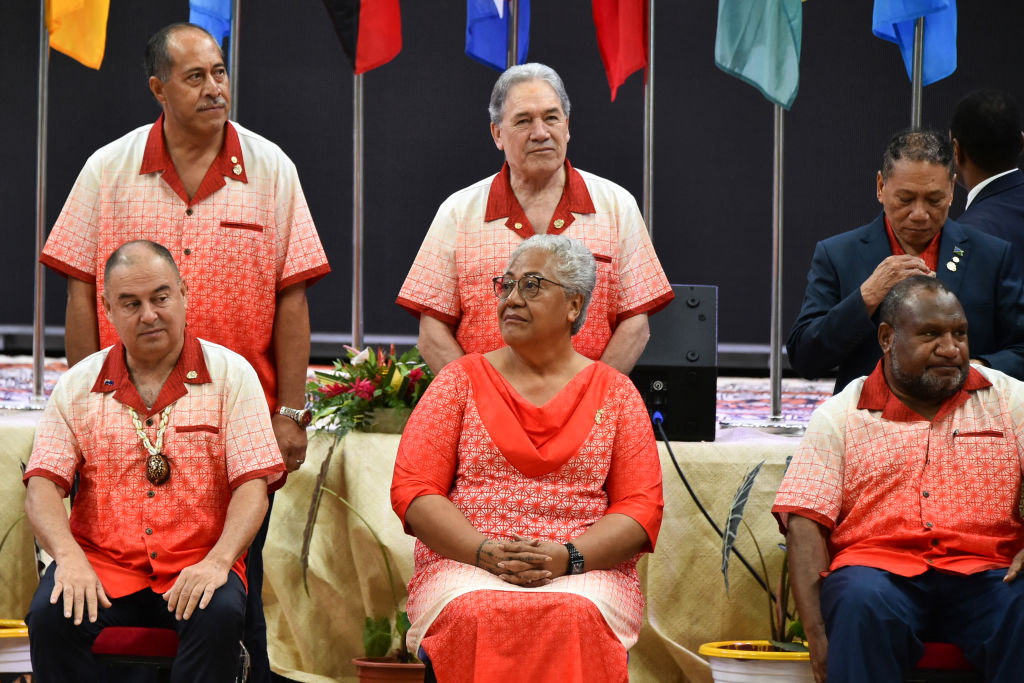Winston Peters has maintained his scepticism of the climate change consensus at the Pacific Island Forum also attended by the UN secretary-general.
New Zealand’s Foreign Minister Winston Peters—in Tonga for the Pacific Islands Forum—has maintained his contrasting position on climate change to visiting U.N. Secretary-General António Guterres.
Guterres opened the event on Aug. 26 warning that countries still looking for oil and gas deposits, such as Australia and New Zealand, were “signing away our future.”
The next day, he appealed for “a surge in funds to deal with surging seas” and called climate change a “crisis entirely of humanity’s making” and a “worldwide catastrophe putting this Pacific paradise in peril.”
With many Pacific nations worried by rising sea levels and an increased number of severe weather events, climate change has dominated the Forum’s agenda.
However, in response to questions on the matter, Peters, also New Zealand’s deputy prime minister, said, “Do I believe in climate change? The answer is for thousands and thousands and thousands of years there has been climate change.”
He suggested Cyclone Gabrielle, which killed 11 people in New Zealand in February 2023, was no different from past storms.
“[A storm similar to] Cyclone Gabrielle happened in the 30s in the Hawke’s Bay,” he said.
“The biggest tsunami in recent times was in 1968. There’s always climate change. There have been massive climate changes down over [millennia]. There was a mini-ice age in the 1600s. We all understand that.
“Our job is to build as much as we can resilience against it whilst we’re transitioning to a new age.”
He also cast doubt over whether New Zealand would continue to offer generous climate subsidies when the current budget runs out next year.
Climate Budget Could Be Cut
New Zealand commits NZ$1.2 billion ($750 million) in climate finance between 2022 and 2025, meaning a new decision must be taken on how much to allocate next year.
The current tri-party coalition government—made up of the National Party, ACT, and New Zealand First—has undertaken major cuts in public spending since taking office, including to an array of climate projects.
Peters is also leader of New Zealand First, a party which has built a support base of voters against vaccine mandates and are sceptical of the climate change science.
His deputy, Shane Jones, told Parliament last week, “I belong to New Zealand First, not ‘climate first.’”
Peters’ comments align with his party’s belief that economic development underpins all other matters.
“If we’re going to help anyone with all the other tsunamis coming their way, such as the health tsunami, food supply tsunami, employment and economic tsunami … we need to have a sound economy ourselves,” he said.
At Odds With Other Leaders, Including His Own
But his view will be at odds with other Pacific leaders.
Tuvalu Prime Minister Feleti Teo said he was delighted that the U.N. highlighted climate change and its effect on smaller countries.
“We’re very grateful for the U.N. secretary-general’s commitment to the cause of the Pacific in terms of climate change, and of course, [reducing] fossil fuels is at the core of it,” he said.

Papua New Guinea Prime Minister James Marape said he “could not be more satisfied” by Guterres’ advocacy.
Meanwhile, New Zealand’s Prime Minister Christopher Luxon, in addressing the Lowy Institute only two weeks ago, said, “Climate change is a profound security threat. As shorelines erode, and extreme weather events intensify, Pacific lives and livelihoods are affected in very real ways.”
AAP contributed to this report.

